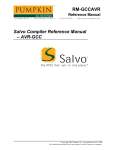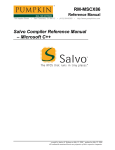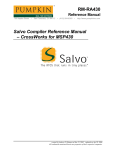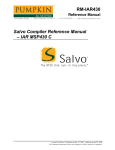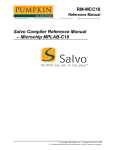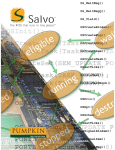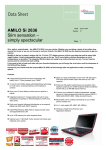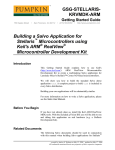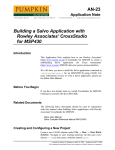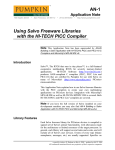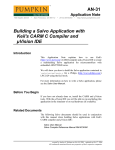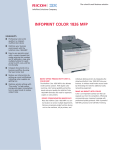Download RM-MCC32 Salvo Compiler Reference Manual
Transcript
RM-MCC32
Reference Manual
750 Naples Street
•
San Francisco, CA 94112
• (415) 584-6360
•
http://www.pumpkininc.com
Salvo Compiler Reference Manual
– Microchip MPLAB C32
created by Andrew E. Kalman on Oct 30, 2007 updated on Nov 20, 2007
All trademarks mentioned herein are properties of their respective companies.
Reference Manual
Introduction
This manual is intended for Salvo users who are targeting
Microchip PIC32 single-chip microcontrollers with Microchip's
(http://www.microchip.com/) MPLAB C32 C compiler and
MPLAB IDE development suite.
Related Documents
The following Salvo documents should be used in conjunction
with this manual when building Salvo applications with Microchip
MPLAB C32:
Salvo User Manual
Example Projects
Example Salvo projects for use with Microchip MPLAB C32 can
be found in the:
\Pumpkin\Salvo\Example\PIC\PIC32
directories of every Salvo for PIC32 distribution.
Features
Table 1 illustrates important features of Salvo's port to Microchip
MPLAB C32.
2
RM-MCC32 Salvo Compiler Reference Manual – Microchip MPLAB C32
Reference Manual
General
Abbreviated as
MCC32
Salvo Lite, LE & Pro
for PIC32
all PIC32 devices
salvoportmcc32.h
salvoportmcc32.S
Available distributions
Supported targets
Header file(s)
Other target-specific file(s)
salvocfg.h
Compiler auto-detected?
Include target-specific header file
in salvocfg.h?
yes
1
recommended
Libraries
Located in
Lib\MCC32
Context Switching
function-based via
OSDispatch() & OSCtxSw()
no
total size must not exceed 65,535
8-bit bytes
Method
Labels required?
Size of auto variables and
function parameters in tasks
Interrupts
Interrupt latency in context
switcher
Interrupts in critical sections
controlled via
Default behavior in critical
sections
0 cycles
user hooks
see example user hooks
Debugging
Source-level debugging with Pro
library builds?
yes
Compiler
Bitfield packing support?
printf() / %p support?
va_arg() support?
no
yes / yes
yes
Table 1: Features of Salvo port to Microchip MPLAB C32
C compiler
Libraries
Nomenclature
The Salvo libraries for Microchip MPLAB C32 follow the naming
convention shown in Figure 1.
RM-MCC32 Salvo Compiler Reference Manual – Microchip MPLAB C32
3
Reference Manual
libsalvolmcc32l-t.s
configuration
a: multitasking with delays and events
d: multitasking with delays
e: multitasking with events
m: multitasking only
t: multitasking with delays and events,
tasks can wait with timeouts
Salvo library
type
f: freeware
l: standard
Microchip MPLAB
C32 C compiler for
PIC32 targets
option
-: no option
i: library includes debugging information
instruction set
l: 32-bit
s: 16-bit
Figure 1: Salvo library nomenclature – Microchip
MPLAB C32 C compiler
Type
Salvo Lite distributions contain freeware libraries. All other Salvo
distributions contain standard libraries. See the Libraries chapter of
the Salvo User Manual for more information on library types.
Target
Since the CPU instruction set is common to all target architectures
based on the PIC32 core, all PIC32 targets use the same Salvo
libraries.
Instruction Set
The PIC32's M4K core supports both 32-bit (default) and 16-bit
instruction sets. When building Salvo applications, it is imperative
that all files (source files and libraries) use the same instruction set.
Option
Salvo Pro users can select between two sets of libraries – standard
libraries, and standard libraries incorporating source-level
debugging information. The latter have been built with the
appropriate command-line options. This adds source-level
debugging information to the libraries, making them ideal for
source-level debugging and stepping in MPLAB. To use these
libraries, simply select one that includes the debugging information
(e.g. libsalvolmcc32lit.a) instead of one without (e.g.
libsalvolmcc32l-t.a) in your MPLAB project.
4
RM-MCC32 Salvo Compiler Reference Manual – Microchip MPLAB C32
Reference Manual
Configuration
Different library configurations are provided for different Salvo
distributions and to enable the user to minimize the Salvo kernel's
footprint. See the Libraries chapter of the Salvo User Manual for
more information on library configurations.
Build Settings
Salvo's libraries for Microchip MPLAB C32 are built using the
default settings outlined in the Libraries chapter of the Salvo User
Manual. Target-specific settings and overrides are listed in Table 2.
Compiled Limits
Max. number of tasks
Max. number of events
Max. number of event flags
Max. number of message
queues
4
8
1
1
Target-specific Settings
Delay sizes
Idling hook
Interrupt hook
Watchdog hook
System tick counter
Task priorities
8 bits
dummy,
can be overridden
dummy,
can be overridden
dummy,
can be overridden
available, 32 bits
enabled
Table 2: Build settings and overrides for Salvo libraries
for Microchip MPLAB C32 C compiler
Note The compiled limits for tasks, events, etc. in Salvo libraries
can be overridden to be less (all Salvo distributions) or more (all
Salvo distributions except Salvo Lite) than the library default. See
the Libraries chapter of the Salvo User Manual for more
information.
Available Libraries
Salvo Lite for PIC32 contains two freeware libraries in a single
configuration. Salvo LE for PIC32 adds standard libraries in
multiple configurations. Salvo Pro for PIC32 adds standard
libraries in multiple configurations with debugging information
included.
RM-MCC32 Salvo Compiler Reference Manual – Microchip MPLAB C32
5
Reference Manual
Each Salvo for PIC32 distribution contains the Salvo libraries of
the lesser distributions beneath it. Additionally, Salvo Pro
distributions contain makefiles for all possible library
configurations.
Target-Specific Salvo Source Files
salvoportmcc32.S
The source file salvoportmcc32.S is required for Salvo Pro
source-code builds.
32-bit vs. 16-bit Mode
By default, salvoportmcc32.S is assembled for 32-bit mode.
salvocfg.h Examples
Below are examples of salvocfg.h project configuration files for
various different Salvo distributions for PIC32.
Salvo Lite Library Build
#define
#define
#define
#define
#define
#define
#define
OSUSE_LIBRARY
OSLIBRARY_TYPE
OSLIBRARY_CONFIG
OSTASKS
OSEVENTS
OSEVENT_FLAGS
OSMESSAGE_QUEUES
TRUE
OSF
OST
3
4
0
1
Listing 1: Example salvocfg.h for library build using
libsalvofmcc32l-t.a
Salvo LE & Pro Library Build
#define OSUSE_LIBRARY
#define OSLIBRARY_TYPE
6
TRUE
OSL
RM-MCC32 Salvo Compiler Reference Manual – Microchip MPLAB C32
Reference Manual
#define
#define
#define
#define
#define
OSLIBRARY_CONFIG
OSTASKS
OSEVENTS
OSEVENT_FLAGS
OSMESSAGE_QUEUES
OSA
7
11
0
4
Listing 2: Example salvocfg.h for library build using
libsalvolmcc32l-t.a or libsalvolmcc32lit.a
Salvo Pro Source-Code Build
#define
#define
#define
#define
OSEVENTS
OSEVENT_FLAGS
OSMESSAGE_QUEUES
OSTASKS
9
1
2
17
#define
#define
#define
#define
#define
OSENABLE_BINARY_SEMAPHORES
OSENABLE_IDLING_HOOK
OSENABLE_TIMEOUTS
OSBYTES_OF_DELAYS
OSBYTES_OF_TICKS
TRUE
TRUE
TRUE
1
4
Listing 3: Example salvocfg.h for source-code build
Performance
Interrupt Latencies
Since Salvo's context switcher for Microchip MPLAB C32 does
not need to control interrupts, Salvo applications can easily be
created with zero total interrupt latency for interrupts of interest.
In a properly-configured application, only those interrupts that call
Salvo services will experience interrupt latency from Salvo's
operations. Users must ensure that these interrupt sources are
disabled (and re-enabled) via the user interrupt hooks.
Disabling and re-enabling interrupts globally in the user interrupt
hooks (i.e., the default user interrupt hook behavior) is of course
permitted, but will result in non-zero interrupt latencies for all
interrupt sources, even those that do not call Salvo services. See
the target-specific source files of this distribution for examples.
Memory Usage
Examples of the total memory usage of actual Salvo-based
applications are listed below.
RM-MCC32 Salvo Compiler Reference Manual – Microchip MPLAB C32
7
Reference Manual
Example Application2
tut5lite
tut5le
tut5pro
Program Memory
Usage3
Data Memory
Usage4
1609
1572
1537
123
123
119
Table 3: Program and data memory requirements for
Salvo applications built with Microchip MPLAB C32 C
compiler
User Hooks
Overriding Default Hooks
In library builds, users can define new hook functions in their
projects and the linker will choose the user function(s) over the
default function(s) contained in the Salvo library.
In source-code builds, users can remove the default hook file(s)
from the project and substitute their own hook functions.
Idling
The default idling hook in salvohook_idle.c is a dummy
function, as shown below.
void OSIdlingHook(void)
{
;
}
Listing 4: Default Salvo idling hook for Microchip
MPLAB C32 C compiler
Users can replace it (e.g. with a directive to put the PIC32 to sleep)
by adding their own version to their application.
Interrupt
The default interrupt hooks in salvohook_interrupt.c is a
dummy function, as shown below.
8
RM-MCC32 Salvo Compiler Reference Manual – Microchip MPLAB C32
Reference Manual
void OSDisableHook(void)
{
;
}
void OSEnableHook(void)
{
;
}
Listing 5: Default Salvo interrupt hooks for Microchip
MPLAB C32 C compiler
Users should replace these hooks by adding their own functions to
either globally disable and re-enable all interrupt sources, or
(preferred) disable and re-enable only those interrupt sources
whose ISRs call Salvo services.
Note Not disabling all source of interrupts that call Salvo services
during critical sections will cause the Salvo application to fail.
Watchdog
The default watchdog hook in salvohook_wdt.c is a dummy
function, as shown below:
void OSClrWDTHook(void)
{
;
}
By replacing this hook with one that clears the watchdog timer, the
watchdog timer will be cleared each time Salvo's scheduler is
called.
1
2
3
4
This is done automatically through the __PIC32MX__ symbols defined by the
compiler.
Salvo 4.0.3.
In bytes.
In bytes. This represents all of Salvo's objects. Does not include RAM
allocated to the heap or stack. Salvo applications typically require the same
(small) stack size as simple, non-multitasking applications.
RM-MCC32 Salvo Compiler Reference Manual – Microchip MPLAB C32
9









